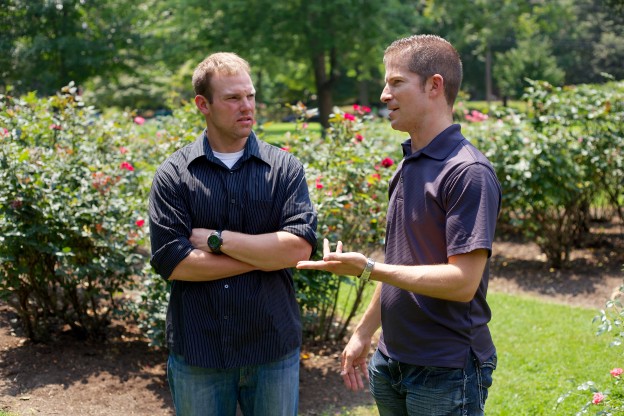
Comparison – A Convenient Trap
December 10, 2014Have you ever fallen into the trap of comparing yourself to someone else? It may go a little like this: his car never seems to have mechanical issues, whereas mine comes up lame just about every week! – OR – her family loves and supports her, why didn’t I have that type of love and support? These should seem foolish to you but I know from experience how convenient it is to become ensnared by these types of questions. And, as James says, if you entertain these thoughts (which are certainly from the enemy) and allow them to take root, they will give birth to sin and then death. We all have experienced both the convenience and the destruction of comparing ourselves with others or their circumstances, things, finances, etc. In the end, this attitude or position of the heart breeds insecurity, encourages bitterness and minimizes the power of the Gospel.
 The truth is there is one person with whom we should align ourselves, and that, of course, is Jesus. No other variable is worth comparison. Don’t misunderstand me, having mentors and accountability partners that spur us on and encourage us are key cogs in our spiritual walks, but only one should stand alone as your measuring stick.
The truth is there is one person with whom we should align ourselves, and that, of course, is Jesus. No other variable is worth comparison. Don’t misunderstand me, having mentors and accountability partners that spur us on and encourage us are key cogs in our spiritual walks, but only one should stand alone as your measuring stick.

The Separation of Church & State – A Brief History
November 25, 2014Where did this concept come from?
Today, what has become known as the “Separation of Church and State” has evolved into something that I believe was not its original intention, if “it” is even a thing. A search into history shows that what’s regarded today with such generality and certainty, many times even driving policy and legislation, has likely been misinterpreted and fumbled by current purveyors of the law.
Luther & Locke
There are traces of ‘separation of church and state’ rhetoric in the writings of both Martin Luther and John Locke, the protestant reformist and British philosopher, respectively. Both leaders, seeing religious disdain and persecution in their own countries, supported a form of religious tolerance.

Locke put it this way:
“Earthly judges, the state in particular, and human beings generally, cannot dependably evaluate the truth-claims of religious standpoints.” – Letters Concerning Toleration (1689-92)

Entrepreneurs & Apostles Part II
November 21, 2014After making the connection between Entrepreneurs and Apostles in a Spring 2014 blog entry, and receiving good feedback about our findings and insight, we’ve decided to revisit the relationship between the two and give you a sneak peek at what’s in the pipeline for Live With Purpose Publishing. So, responding to popular demand, consider the God-breathed apostolic spirit in relation to the business-centric entrepreneurial spirit in the excerpt that follows!
 Tapping into our birthright – CREATING
Tapping into our birthright – CREATING
“Then God said, “Let us make mankind in our image, in our likeness, so that they may rule over the fish in the sea and the birds in the sky, over the livestock and all the wild animals,and over all the creatures that move along the ground.”
So God created mankind in his own image,
in the image of God he created them;
male and female he created them.

Basic Instructions Before Leaving Earth
November 17, 2014Did you ever hear someone say something that simply stuck with you? I recently heard such a statement, and it’s actually the very title of this post.
I recently heard this statement as I listened to a leader in my life whom I admire, Raymond Harrison. I’m pretty confident that it isn’t something he created, but it really stuck with me and inspired me to share it with you today.
It is said that any truly successful public speaker is able to engage their audience in such a way that they will leave the venue or meeting place and remember at least one important sound bite that could make an impact on their lives. I believe that Pastor Ray’s recent statement can do that very thing for you today.
“Basic Instructions Before Leaving Earth”

Simple Truth – Unpacking the Statement
I would venture to say that in many nations today, including America, the bible is something that is fairly common. I am not implying that most people know the Bible, I simply am stating the fact that many people have heard of the Bible. It also isn’t too hard to imagine that with today’s culture which regularly challenges biblical thinking by way of new, free thinking mantras and monikers, that what people do with this incomparable world resource varies quite a bit. Some people say it was a good book written by men to help people. Others might agree but say it lacks relevance today. Some say it is divinely inspired. Others feel it is a man-made scam.

The Facade of Progress
November 11, 2014‘Progress’ has become a term often associated with a political class that finds its home in modern liberal ideologies (as a opposed to classical ones) and loosely uses the word ‘progress’ to sum up its goals and motives. Instead of pigeon holing all who subscribe to this ideal, it’s at least worthwhile to consider the broad, two-fold question of a. where are we headed? and b. where have we come from? Addressing this answer first, I think, would help those struggling with the concept (like me) comprehend what this movement is all about.
Generally, ‘progress’ would assume a migration out of the former into something else entirely; perhaps a perpetual state of progress?
A Christian friend of mine working in the sphere of politics asks the question, which certainly begs a clear answer: what exactly are we progressing toward? To what end does this conviction espouse? It’s become not just a conviction but a policy, platform and rallying cry for many who think it just and righteous. But is the answer to this straightforward question a facade?

It’s too political for comfort
Is the idea of progress more about the good of society or the art of politicking? It’s become such a partisan topic that another question that comes to mind for its proponents is: are you more concerned with doing what’s right or antagonizing conservatism and the church? (those two are not necessarily synonymous) If the answer truly lies with the former, then so be it, we can all rest assured that progressives believe that what they are doing is right. If it’s the latter, then we are entering a different landscape, one marked with enmity, discord, dissension, and ultimately division. If progressivism is merely a reaction to another point of view, than I think it loses a lot of credibility, since it’s then no longer original and aimed at opposing something else rather than offering a solution to a problem. By the way, enmity, discord and dissension, three potential fruits of this type of assault, are three “sins of the flesh,” according to Paul in Galatians 5:12-21. Division, which is essentially the symptom of all three, just happens to be Satan’s go-to tactic in defiling the church. Surely it goes without mention (but I am mentioning it) that I don’t believe this political camp is alone in its seemingly nefarious dealings and purposes, in fact I believe we’re dealing with perhaps the most corrupt political sphere in American history at large right now.

Book Review: The Harbinger
October 9, 2014“The Harbinger” – Jonathan Cahn
The Ancient Mystery that Holds the Secret of America’s Future
The Harbinger, although not compatible with my very strict preference for non-fiction, was a very hard book to put down, not fitting the mold of typical fictional choices. Cahn is a skilled student of the Bible with a clear authority for the scriptures and the concealed details and meanings therein, which makes this book a delight for prophetic people or just those who enjoy a good thrill. The story is told well with plenty of added suspense, characteristics too of an easy sell.
There is something captivating about revisiting ancient prophecies, one of which is laid out in Cahn’s Harbinger. It’s the a prophecy of judgement declared against Israel by the prophet Isaiah in the aftermath of Israel’s growing independence and pride, and on the eve of their destruction. Cahn tells this story in novel form and uncovers an application for this prophetic series of warnings for Americans, here and now.
